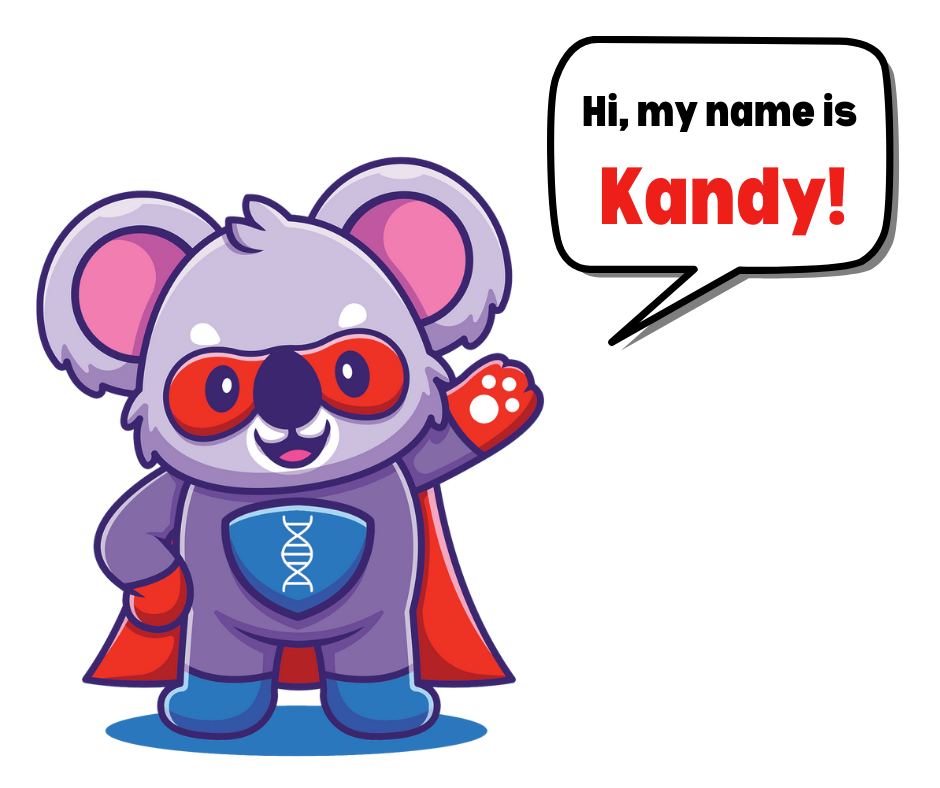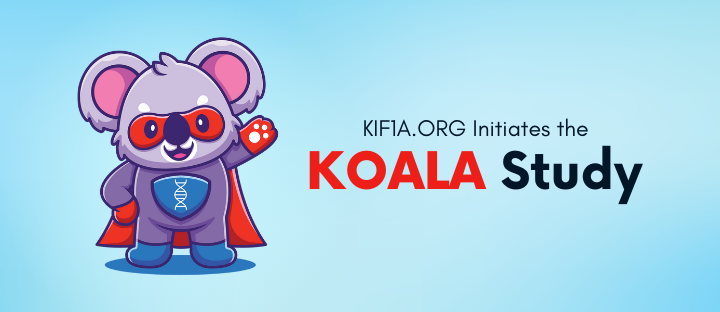Dear KIF1A.ORG community,
On Rare Disease Day 2022, KIF1A.ORG is announcing a new initiative with our collaborators at Columbia University. The KOALA Study will accelerate discovery and development of medicines for KIF1A Associated Neurological Disorder by developing and identifying standardized tools and assessments to support approval of future KAND therapeutics. Since 2017, we have been working closely with the scientific community to prepare for the world’s first KAND clinical trials. Today, as KAND clinical trials are within sight, we’re investing in the readiness of the KAND community to investigate potential treatments for KAND.
An absence of KIF1A-appropriate endpoints to measure efficacy in clinical trials is a major obstacle in our path to treatments, and we are taking a wrecking ball to that obstacle. The goal of the KOALA Study is to identify standardized tools to measure what a change in trajectory of KAND looks like for patients affected by mutations in KIF1A after we introduce a therapeutic. The KOALA Study will expand upon the current, robust KIF1A natural history and add elements of study that are critical to the process of approved treatments.
Before explaining the KOALA Study, let me summarize the remarkable effort that made this possible. In 2017, when KIF1A.ORG was just established, KIF1A Associated Neurological Disorder (KAND) was so rare, it didn’t have a name. We knew mutations in the KIF1A gene could lead to disease, but we didn’t know the range of symptoms, severity and progression of the disease we now call KAND. We didn’t know how to find treatments to fix this broken gene, but we did have a team of elite scientists and physicians willing to guide us: Dr. Wendy Chung and her team at Columbia University.
Our clinical understanding of KAND emerged in early 2017, after 14 families from KIF1A.ORG shared their medical history and records through the Natural History Study managed by the Chung Lab. A picture of KAND began to take shape, but there were still too many missing puzzle pieces preventing us from understanding the progression of KAND and how to treat it. We needed to find 100 patients and rigorously collect data. Despite how daunting this challenge seemed, we did it.
Today, over 150 patients are enrolled in the Natural History Study, and that number continues to grow as more patients are diagnosed with KAND.
Because of the contributions and participation of KAND families sharing their lived experience, and the dedication of the research and clinical staff at the Chung Lab, we have significantly improved our understanding of what KAND is, the mechanism of disease, and clear therapeutic strategies to bring treatments for this generation of patients and families.
Without treatment, KAND patients will continue to experience degenerative and severe symptoms that affect every aspect of their lives. For too many, KAND is a life-threatening disease with a fatal outcome. Researchers and biotech leaders are working urgently to discover and develop therapeutics for KAND—to stop the devastating progression of the disease, improve symptoms, and eventually cure KAND. When clinical trials for KAND begin, we will need to clearly measure changes in disease and rate of progression to successfully measure what a meaningful therapeutic change looks like, and what it means to change the trajectory of life and outcomes for our loved ones. That’s where the KOALA Study comes in.
KIF1A.ORG and the Chung Lab are initiating a new phase of research to not only expand the natural history of KAND, but also integrate standardized assessments to measure changes in KAND progression and severity of disease. The KOALA Study (KIF1A Outcome measures, Assessments, Longitudinal And endpoints Study) will generate validated outcome measures and endpoints needed to conduct clinical trials and gain regulatory approvals. If you can’t measure it, you can’t fix it. The KOALA Study will build on our natural history and identify appropriate tools to measure change.
To capture these data, the KOALA Study will enable patients to participate in clinical assessments at Columbia University Irving Medical Center in New York City. These assessments will be standardized and investigate multiple domains of KAND, including motor function, cognition, epilepsy and vision. As we have done the last five years, the KIF1A.ORG family community will work closely with the Chung Lab team to help the scientific community understand what matters most to KAND families. Learn more about the KOALA Study in this Press Release, with comments from KIF1A.ORG Founder and Board Chair, Luke Rosen, and Dr. Wendy Chung.
To enable every KAND family eager to participate in the KOALA Study, KIF1A.ORG will also launch a financial assistance program to lessen the burden of travel for patients and their caregivers traveling to the clinic. Wherever you live, whatever language you speak, KIF1A.ORG exists to empower you to participate in KAND research and our mission to discover treatments. As we finalize the KOALA Study in coordination with the Chung Lab, we will share more details about participation and how we can help your family play an active role in KAND research.

One very important decision has already been made. Last week, we asked you on social media to help us name our new KOALA friend. After carefully considering dozens of creative and adorable ideas, we decided on… Kandy! (Get it? KAND-y?)
On this Rare Disease Day, I hope you feel even more optimistic about the future of our loved ones living with KAND. Through the KOALA Study, we are even more of a clinical-trial-ready community driving research to #StopTheClock on KAND and support discovery of therapeutics.
To every patient, family member, researcher, clinician, and therapeutic developer who has joined our mission: thank you for helping us change the fate of KAND.
Relentlessly,
Kathryn Atchley
President, KIF1A.ORG
kathryn@kif1a.org


Oh my gosh, this made me cry. I’m so impressed and grateful to have you all. We will help in any way we possibly can.
Your efforts are much appreciated. Our grandson has been identified as KIF1A. We have witnessed the heartbreaking realities of this condition. The continual high level of intensive care, physical and emotional, is exhausting and sacrificial. It is helpful to know that your team is searching for ways to develop standards and possible. treatments. Our daughter and her husband have been excellent parents, guided by love and intent on maximizing our grandson’s abilities. Meeting with your team was reassuring and hopeful.
This is amazing news! We can’t wait to be a part of this!
I am so impressed by the collection of efforts and power of these families and teams. The thought of 14 families banding together just 5 years ago to the future of therapeutics for KAND patients is just incredible. Thank you for all your hard work!
Great news!!! 💙 Thank you so much, you are an incredible team !!! So excited for Danny and all our kids 🙏🏻🙏🏻
This is wonderful news about the KOALA Study and you have chosen a great name for the mascot! Please rush the stuffed animal version of Knady to market as I am sure it will be well received. I hope to be one of the early purchasers!
So happy to hear this!!! We can’t wait to be a part of it.
We have been very grateful to at least have the correct diagnosis for my son who just turned 45. We hope to participate in any way and have hope to treat his motor and vision functioning which are worsening.